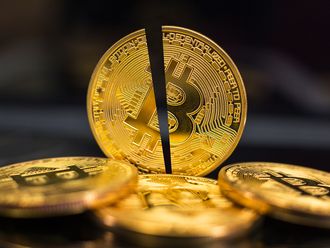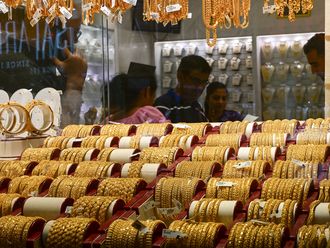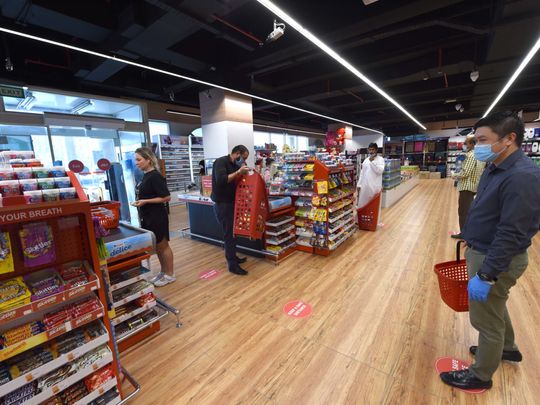
Tips to save money on grocery shopping
A grocery list of essentials under Dh175 a week
A list of possible non-essential grocery purchases outside the budget
Dubai: Every week, my mom sits in our comfy sofa with her glasses on, taking one booklet from a pile of similar ones – pen in hand. We usually make fun of her, for looking very serious and teacher-like, as she marks, circles and crosses out things in four or five different booklets.
Each booklet is one of the promotional offers brochures that supermarkets in the area distribute to residential buildings – you might have seen them in your reception area and ignored them. These - along with a few well-planned SMS subscriptions and Facebook page alerts - are what help my mom buy everything we need, and want, on a budget.
In this piece, I will detail how we buy grocery essentials staying well within a set budget of Dh700 each month. This doesn’t include extraordinary purchases, organic hauls or major treats.
Here are few generic tips before you get started
Vague meal plan - weekly
You don’t need to chart out every single meal you plan on making each day of the week. Just keep in mind the kind of dishes you would make or you plan on making and pick up ingredients divided into essential daily items such as eggs or milk, with other meal-specific items such as avocados or certain herbs. Take a list with you no matter how small or big and while this is not set in stone, it helps make sure that you buy everything you need before picking up something you see in the store.
Get that loyalty card and use it
Every supermarket chain has a loyalty program that’s free to join. Usually people forgo the process just to check out faster. Getting that card can save you some serious money (up to 30 per cent as compared to without it), especially during peak promotional times such as Eid or Ramadan.
For example, Union Co-op has Tamayaz cards (gold and silver) which give you additional discounts as compared to regular shoppers on sale days while Carrefour has Club Cards that add up points based on your purchases.
You don’t need to stock and hoard
Saving money is not always about buying in bulk and hoarding for months. You need to look at promotions as a timeline to buy certain less perishable items such as rice or wheat. If you need some rice immediately and there are no promotions, buy a kilo and wait for the promotions that will happen every month. Don’t plan to stock up the entire pantry in one go unless it seems cheaper to do it that way. Breaking up your shopping can save you money if you’re smart about where and when you shop.
We conducted a poll on our website to ask people how they save money on grocery shopping and guess what over 68 per cent of UAE residents do – never buy more than what they need.
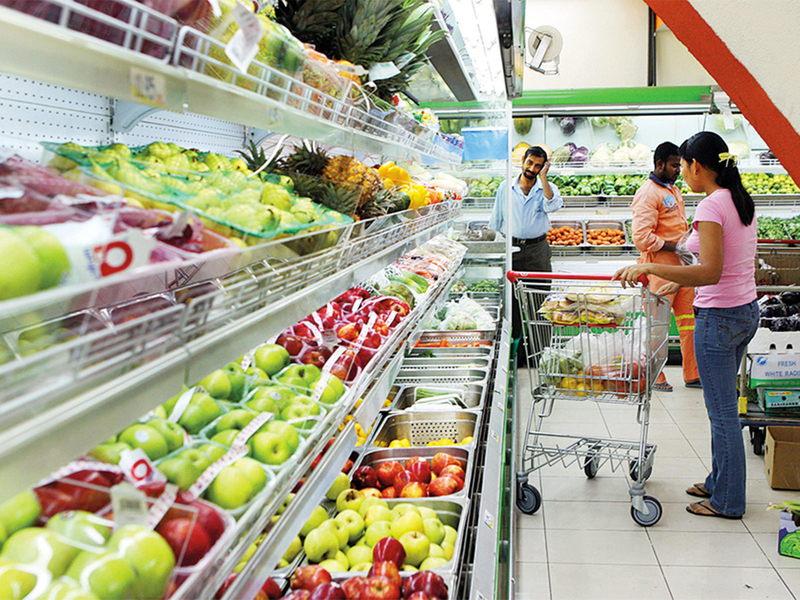
Don’t throw away those brochures
Bunch of brochures on your doorstep? Take five minutes to skim through them before dumping them and you might find your favourite organic jam on an incredible offer or a meat at great prices. Three dirhams there and four here one at a time add up over your shopping trips. Stores also advertise their lowest rates in newspapers and you can usually find these promotional offers in Gulf News as well.
Don’t buy everything from one place
It is the easiest thing to do when you shop everything you need from a single store – done and dusted in a go. However, you might be paying more than you should on some groups of food by doing this. Find affordable supermarkets and hypermarkets near you that are best for specific food groups while also buying what you need. This may mean two shopping trips a week, but could save you hundreds of dirhams in the long run.
For example for Asian food, ingredients are cheaper in certain stores such as Lulu or Shaklan while continental and international food ingredients may be cheaper elsewhere, like Carrefour.
Never buy seafood from the supermarket
Fish from supermarket chains is extremely convenient but also marked up heavily. Head to the now renovated Deira Fish Market just once a month. Buy fresh seafood and freeze them in batches as soon as you get home to thaw and cook whenever you need during the month. You can even get fruits and vegetables here - so compare prices and buy if cheaper.
Frozen fish is good for atleast four to six weeks and this one trip will save 40 per cent of the money you spend on buying fish every week at your local supermarket.
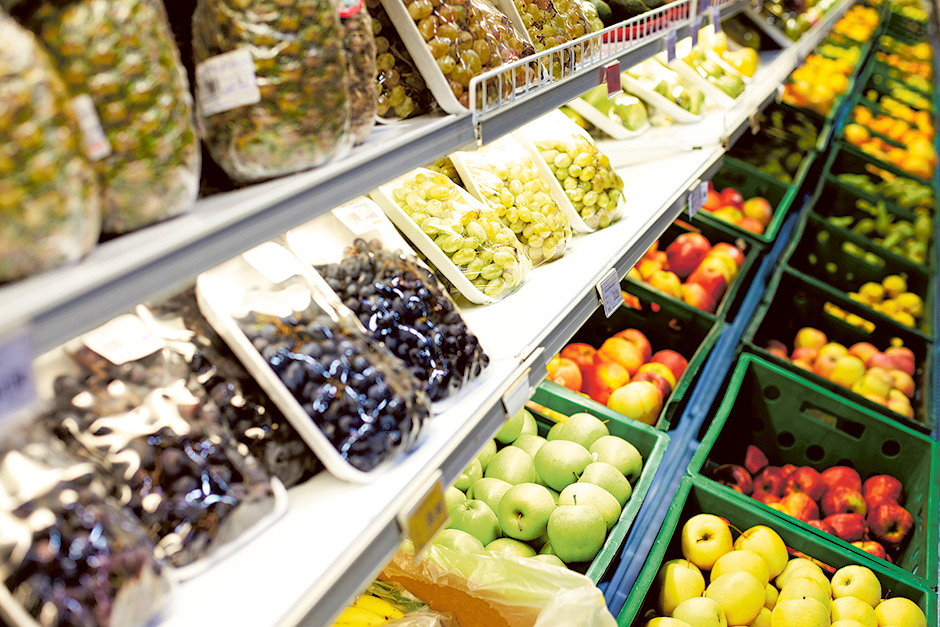
Fruit and vegetable days
Some supermarkets have specific days during the week when they run up to 50 per cent off just on fruits and veggies. Stores that do this include Lulu, Shaklan and Union Co-op supermarkets. This is usually mid-week, so that loyalty card and SMS subscription is going to help you save some money. People who already have the loyalty cards gain the most during promotions.
Get more expensive fruits such as berries and plums, or imported vegetables such as zucchini and cauliflower on sale on these days. We also buy the fruits of the week based on sale promotions – usually apples, oranges or Chiquita bananas.
Frozen is better for your wallet
Love berries but too expensive? Get three times the berries at the same price as fresh ones in a frozen bag. These being frozen as soon as they’re plucked (allegedly) retain much of their taste and tartness when you want to use them. This also makes sure berries like strawberries, that go bad fast, need only be taken out when you need it.
Same goes for chicken – buy frozen chicken. Every week supermarkets run sales on frozen chicken – usually two for the price of one. If you prefer fresh, there are sale promos for that too – just check store Facebook pages, comparison websites and again, brochures. For example, this week you could get Dh5 savings for each kilo of fresh chicken you buy at certain supermarkets.
Look at where the veggies come from
Most supermarkets have different variants of the same vegetables, priced differently based on their country of origin. Try the cheaper ones and if you like the substitution that could save you two to three dirhams per kilo. Some budget options for vegetables are Australian carrots, Iranian or Indian onions (based on promotions) and Jordanian tomatoes.
Seasonal is good for the wallet
While we’re lucky to be in the UAE where most fruits, vegetables and protein are avaible year-round, seasonal produces is cheaper since it is more abundantly available. This, as can be expected, goes for fruits and vegetables. But this also works in case of fish.
A tip from my dad is to buy fish that is seasonally available. For example, kingfish being more abundant in the winter is cheaper then.
What’s in a colour?
A tiny compromise in taste and aesthetics could save you money. While red, green and orange capsicums (bell peppers) look amazing in salads and taste slightly different, your budget tip is to buy green bell peppers if you’re looking at just getting that spicy yet sweet bell pepper taste.
Same goes for certain kinds of grapes. Eggs could also fall in this category, however, the egg colours do signify a difference in farming methods. Prioritise what you need for your family and spend accordingly.
Pick the bottom row for packed foods
Want cereal, flours or sugar? Pick up the ones on the lowest row of the shelf and compare prices with the ones on your eye-level – yes, always cheaper. Packed foods are also cheaper when they’re the supermarket’s own brands. It’s the same thing, just packaged differently. We also have an entire guide on how to walk through a supermarket in the best way to save money while shopping.
Nothing fancy
There are some items we definitely ignore on our shopping trips. For example, we rarely buy cherry tomatoes – while they taste amazing and look good – the volume one gets vis-à-vis the price is not economical. Same goes for things like seedless grapes or organic arugula leaves. Buying any such ingredients would depend on specific dishes planned for the week, in addition to our essentials
Get online to find discounts
With online supermarkets it is even more easier now to buy groceries safely and at a bargain. Compare different websites to find the best products at the best price. Most physical stores now have a website and a Facebook page that you can follow for alerts on promotions. There are also several comparison websites and apps that can show you the best offers compiled from various stores.
Disclaimer: This is a general guide and should only be taken as such. Mentioned prices may change from and Gulf News is not responsible for any losses resulting in following these tips.
Grocery list
For this story, I used regular prices as seen in the first week of October so as to make it relevant for you, the reader. Bear in mind, that since these are mostly regular prices, you might get even lower amounts on your bill if you follow our tips.
Being a regular Indian family, I have listed down what we consider essentials and non-essentials. This may differ for you based on your cuisine but the major items on the list would probably remain the same – protein, grains, herbs, fruits and vegetables. While we do buy from both lists this process will give you an idea of how and where money could be saved.
Essentials
- Brown rice Dh4 (5-kilo bags for four weeks at Dh19.95)
- Whole wheat flour or atta Dh6 (5-kilo bags for four weeks at Dh22.50)
- Onions Dh3 per kilo
- Tomatoes Dh3 per kilo
- Carrots Dh4.25 per kilo
- Cucumbers Dh3.60 per kilo
- Chicken Dh26 per kilo (Dh13 per kilo average on fresh or frozen)
- Curry powders Dh2 per week (five to six weeks)
- Fish (varies based on season, type) Around Dh35 per kilo
- Green peppers or capsicum Dh5 per kilo
- Green chilli Dh2 per week (Dh8.75 for a kilo)
- Salt Dh0.50 per week (Dh2.75 per kilo of table salt)
- Lentils Dh3.5 per week (Dh14 for one-kg packs)
- Chickpeas Dh2.5 per week (Dh10.50 for one-kg bag)
- Cooking oil Dh3 per week (Dh12 for one litre of sunflower oil)
- Virgin olive oil Dh3.8 per week (500 ml a month)
- Lemon Dh2.75 (500 gms of local lemons)
- Fresh Milk Dh10.50 for 2 litres
- Sugar Dh1.50 per week (Dh12.50 for 5kg store-brand)
- Bread Dh4.60 a week for sliced bread
- Grated coconut Dh6 per week (2 boxes a week)
- Eggs Dh9 per week (Dh18 for 30 eggs)
- Coriander/Parsley/Mint Dh4 per week (used within a week)
- Potatoes Dh3 per kilo
- Yoghurt Dh5.25 for one litre pack
- Fruits (apple, orange) Dh15 for two kilos of seasonal fruit
- Aromatic (ginger, garlic etc.) Dh6 per week
Total price per week Dh174.75 per week for a family of four or Dh699 per month.
Non-essentials (we only buy on sale or if we need it for that week)
■ Other fruits (grapes, pomegranate, berries, plums or avocadoes)
■ Nuts
■ Cheeses
■ Honey
■ Spaghetti and noodles
■ Sausages
■ Condiments such as ketchup or mayo
■ Cereal
■ Biscuits, cookies and treats
■ Peanut butter or other nut butters
■ Other non-dairy milk such as almond, coconut or soya
■ Any specific vegetables such as zucchini, cauliflower or eggplants


